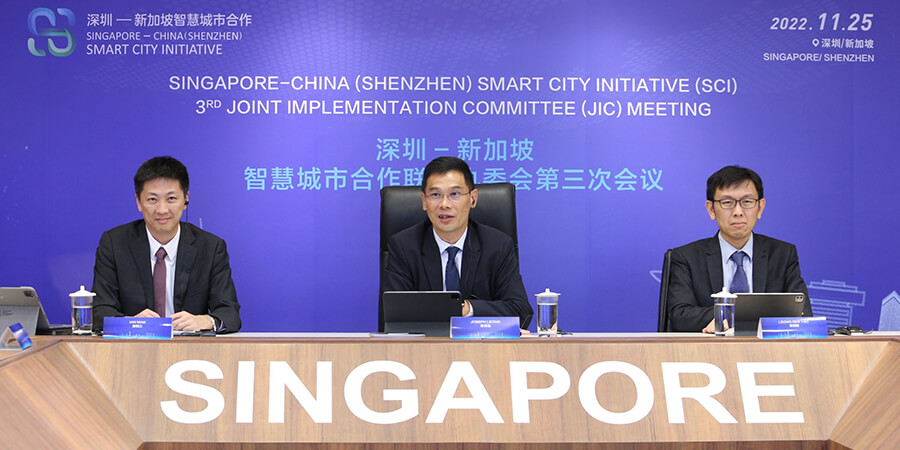The Ministry of Communications and Information (MCI) and Infocomm Media Development Authority (IMDA) inked eight Memorand of Understanding (MOU) and unveiled 14 new joint projects under the Singapore-China (Shenzhen) Smart City Initiative (SCI) at the 3rd Joint Implementation Committee (JIC) meeting.
The JIC is co-chaired by Permanent Secretary for Communications and Information Joseph Leong and Mayor of Shenzhen Municipal People’s Government Qin Weizhong. The meeting reported a doubling of the number of new joint projects compared to the previous year, as the SCI enters its third year of implementation. These new projects will deepen the ongoing collaboration between Singapore and Shenzhen in enabling digital transformation and policy innovation and create new opportunities for our businesses and people in research and innovation, trade, sustainability and talent development.
Leong said, “The Singapore-China (Shenzhen) Smart City Initiative, launched in 2019, has built stronger digital and business linkages between Singapore and Shenzhen. Despite challenges of the pandemic over the past three years, both sides have worked hard to enhance SCI as an effective platform for digital innovation, smart city cooperation and business and people exchanges. Singapore and Shenzhen will actively promote a conducive business environment for companies to innovate and conduct cross-border transactions safely and smoothly, as we strengthen our economic recovery and resilience.”
One of the key areas of cooperation in the past year has been the facilitation of digital trade through the use of electronic Bills of Lading (eBLs). IMDA and Shenzhen’s Bureau of Commerce have assessed the results of successful technical trials on trade in the past year, and both sides are now poised to expand IMDA’s TradeTrust pilot with live commercial transactions involving banks, shippers and other partners. This would pave the way for full digitalization of the trade supply chain and bring the benefits of faster and more secured digital trade transactions to the ecosystem.
IMDA has also been deepening its collaboration with TusStar, a leading technology incubator in China with an innovation network of more than 10,000 companies. In this next phase, TusStar will increase its regional presence in Southeast Asia by establishing hub operations in Singapore and also expand its network in the areas of artificial intelligence (AI), augmented reality/virtual reality and sensor technology. This partnership will connect technology start-ups from Singapore, Shenzhen and other cities in China to new markets in the region.
The 14 new joint projects reflect the transformative role of digital technologies across the SCI’s focus areas of digital connectivity, talent exchange/development, innovation and entrepreneurship. Notable projects feature the use of advanced technologies and AI for the green economy and sustainability, such as reducing carbon dioxide emissions to the atmosphere and enhancing battery management for electric vehicles.
To date, a total of 29 projects have been initiated and 21 MOUs have been signed under SCI. This strong momentum in SCI collaboration is a testament to Singapore and Shenzhen’s leading roles in digital economy development and the potential for SCI’s innovative projects to be scaled to more cities in Southeast Asia and the Greater Bay Area.





